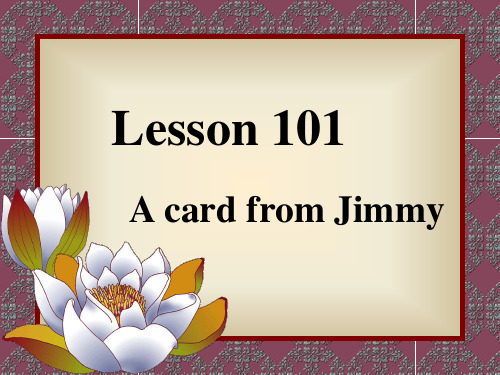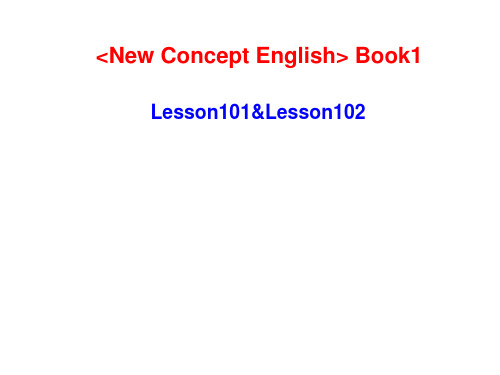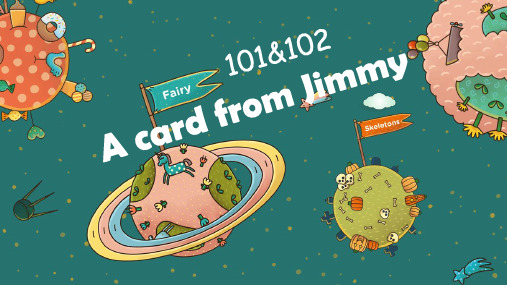新概念英语第一册lesson101-102
新概念英语第一册L101~102

Lesson 101 ~ 102 A card from Jimmy◆ 词汇详解(1) Scotland n. 苏格兰词意衍生:Scottish n./adj. 苏格兰人(的)e.g. He comes from Scotland. He is Scottish.(2) card n. 明信片e.g. Have you received my card? 你收到我的明信片了吗?【学生版不出现】常用搭配:表示信息:identity card 身份证表示金钱:bank card 银行卡credit card 信用卡表示问候:birthday card 生日卡(3) youth n. 青年,青春e.g. He is a successful youth. 他是个成功年轻人。
(4) hostel n. 招待所,旅馆e.g. There is a youth hostel over there. 那里有个青年招待所。
【学生版不出现】相对于hotel来讲,hostel价位更便宜,设施较简单(5) soon adv. 不久e.g. I will call you soon. 我马上就打电话给你。
(6) write v. 写(write - wrote - written)e.g. She could read and write when she was five. 她五岁时能读写。
常用搭配:write down 写下来【学生版不出现】词意扩展:还可解释写信;作曲e.g. I wrote to you three days ago. 我三天前写了信给你。
Mozart wrote a lot of famous music. 莫扎特作了许多有名的曲。
◆ 课文解析之经典例句(1) Read Jimmy’s card to me please, Penny.!结构:祈使句!常用表达:read sth. to sb. 意为“给某人读……”"试一试:请把下列句子改为祈使句1. You must stay at home these days.Stay at home these days.2. You’d better go to school on foot.Go to school on foot.(2) He says he’s just arrived in Scotland.He says he’s staying at a Youth Hostel.You know he’s a member of the Y.H.A.!语法:前两句为间接引语的句子"试一试:Tom says, ‘I have learnt English for 6 years.’Tom says he has learnt English for 6 years.!语法:第三句为宾语从句!常用表达:a member of 意为“……的一员;……的会员”!arrive in 与arrive at 的比较:in一般接比较大的地方的名词;at接比较小的地方的名词。
新概念英语第一册 Lesson 101 - 102

反义疑问句
表示询问、惊讶、愤怒等感情。
结构: 陈述句
+ 简略疑问句
使用规则: A. 陈述部分与疑问部分的动词时态和动词性 质应保持一致 ; B. 陈述部分与疑问部分 “肯定” 和”否定” 形式彼此相反 。 He likes books, doesn’t he? The dinner isn’t ready, is it?
迪拜帆船酒店
Burj Al Arab hotel
association
n.协会,联盟
New Words
the Football Association
足球协会
soon
adv.不久, 很快, 早
New Words
我们很快就 回来。
我们一会再见。
write
v.写,写字;写作
New Words
He wrote some very famous books.
• The doctor comes at once, doesn’t he ? • They stay in a Youth Hostel, don’t they ?
• Jimmy didn’t write much,
did he
?
hasn’t he ? • Jimmy has arrived in Scotland,
Where did Jimmy stay in Scotland? Which association does Jimmy belong to? Did Jimmy say much? Why? Is grandmother happy to get a card from Jimmy? Why or why not?
新概念英语第一册101-102课课件 (共43张PPT)

本课内容
• • • • • • 单词学习 直接引语和间接引语 课文讲解 翻译句子 翻译对话 作业
单词学习
• • • • • • • Scotland n. 苏格兰(英国) card n. 明信片 youth n. 青年 hostel n. 招待所,旅馆 association n. 协会 soon adv. 不久 write(wrote, written) v. 写
• 如果直接引语为祈使句,变为间接引语时 多用“名词(代词)+不定式”结构。 • 1)引述表示命令的祈使句,常用动词order, tell, warn; • 2)引述表示请求的祈使句,常用动词ask, beg; • 3)引述表示建议、劝告的祈使句,常用动词 advise等。 • The boss said,“Please come here again tomorrow.” The boss asked me to go there again the next day.
She lost her youth.
She kept her youth.
• association n. 协会 • 我父亲是牙医协会的会长。 • My father was the president of the dental association. • 在组织或者机构前要加定冠词the • the United Nations • the International Olympic Committee
• 微博:58岁大姐吃得太多,胃爆炸了 • 著名微博达人“@营养师顾中一”是北京友谊医院的营养 师,拥有上百万粉丝,前天他转发了一条微博,说的是一 个病例:“患者女性,58岁,进食大量食物及啤酒,餐后 突发腹痛腹胀1小时来院急诊,患者腹胀如鼓,全腹压痛。 腹部CT显示,胃扩张。” • 尤其让人惊讶的是:“进腹时腹腔内高压可燃气体喷出, 灭火后手术继续。腹腔内大量黑色浑浊液体混有食物残渣, 胃壁破损严重,胃小弯贲门至幽门全程炸裂。” • 又是“胃爆炸”,又是“起火”,这场手术真是让人紧张。 最后的结果也是十分令人遗憾,由于患者病情太重,不得 不全胃切除。
新概念英语第一册 Lesson101-102 (共20张PPT)

注意: 没有Yes, he can’t./ No, he can.这种回答哦!
回答为肯定→Yes, +肯定回答. 回答为否定→No, +否定回答.
试一试:
( D) 1. His sister had a bad cough, _________ she?
=> 简略问句的主语要用___代_词____。如:
e.g. John has gone to Beijing, hasn’t he? 他去北京了,不是吗? You don’t like cats, do you? 你不喜欢猫,是吗?
需注意:当反意疑问句前半句为否定句时,回答要根 据实际情况作答。 e.g. Jimmy can’t speak English, can he? 吉米不会说 英语,对吗?
__S_t_a_y _at_h_o_m_e_t_h_es_e_d_a_ys_______.
2. You’d better go to school on foot. __G_o__to_s_c_ho_o_l _on__fo_o_t ___________.
He says he’s just arrived in Scotland. He says he’s staying at a Youth Hostel. You know he’s a member of the Y.H.A.
Role Play
课文详解
(1) Read Jimmy’s card to me please, Penny. 结构:祈使句 常用表达:read sth. to sb. 意为
给“_某_人_读__…__________” 试一试:请把下列句子改为祈使句 1. You must stay at home these days.
新概念英语第1册第101-102课课文详解

新概念英语第1册第101-102课课文详解新概念英语第1册第101-102课课文详解导语:明信片所写的内容公开,可被他人所看见,内容通常不涉及隐私权之虞,故称为明信。
下面YJBYS店铺带来有关明信片的英语课文及详解,欢迎大家前来学习。
Lesson 101 A card from Jimmy吉米的明信片Listen to the tape then answer this question.Does Grandmother seem pleased to get a card from Jimmy? Why/Why not?听录音,然后回答问题。
收到吉米寄来的一张明信片,祖母是否显得高兴?为什么/为什么不高兴?Grandmother: Read Jimmy’s card to me please, Penny.祖母:请把吉米的明信片念给我听听,彭妮。
Penny: “I have just arrived in Scotland and I’m stayin g at a Youth Hostel.”彭妮:“我刚到苏格兰,我现住在一家青年招待所。
”Grandmother: Eh?祖母:什么?Penny: He says he’s just arrived in Scotland. He says he’s staying at a Youth Hostel.You know he’s a member of the Y.H.A.彭妮:他说他刚到苏格兰。
他说他住在一家青年招待所。
你知道,他是“青招协”的一个成员。
Grandmother: The what?祖母:什么?Penny: The Y.H.A., mother. The Youth Hostel’s Association.彭妮:“青招协”,妈妈。
青年招待所协会。
Grandmother: What else does he say?祖母:他还说了些什么?Penny: “I’ll write a letter soon. I hope you are all well.”彭妮:“我很快会写信的。
新概念英语第一册101-102课课件 (共43张PPT)

When else can we meet again? • 你还去过其它什么地方?
Where else have you been? • 还有谁能做这件事?
Who else can do it?
• He doesn’t say very much, does he?
They were just cheating. The teacher came here. • 他正要离开,他的父母打电话了。
He was just leaving. His parents called.
• arrive in + 城市/国名(大地点) • 她昨天到了马德里。
She arrived in Madrid yesterday. • arrive at +公共场所地点名称(airport, park,
He is an engineer, isn’t he? 实际情况:He is an engineer. --Yes, he is. • 他不是一个工程师,是吗? He isn’t an engineer, is he? Yes, he is.
翻译句子
• 今天天气真好,不是吗?(反义疑问句) • 她上个月去了巴黎,是吧? 是的,她去了。 • 他说他要去美国了。(say that) • 恐怕我看不太清楚。(be afraid that) • 你没去上学,对不对? • 你根本没给他打过电话,是吗?! • 他们说老师马上就回来。(say that) • 我朋友说他要给我寄明信片。(say that) • 我的新家离你很近,不是吗?(反义疑问句) • 你不爱喝咖啡,对吗? • 你今天又迟到了,是不是?
新概念英语NCE1_Lesson101-102(共13页)课件

你还记得吧? • 我知道,你听我把话说完嘛。她不去深圳了,她说
她要先去一趟香港,因为她打算去香港工作了。 • 天哪,她怎么都没有告诉我呢。 • 因为你知道了一定又会大呼小叫,就像现在这样。
•
翻译下列句子
• 我想她伤着她的脖子了。 • 对不起我必须先把房间打扫干净。 • 妈妈说不能看这么久电视。 • 我确定医生需要给你的背做X光透视。 • 他确定这个人就是他的父亲。 • 很抱歉我不能告诉你。 • 她说她喜欢我很久了,可我并不喜欢她。 • 我觉得我可能弄伤了我的腿。
翻译这篇文章
• 今天我想给苏珊打电话,可是她不在家。 • 是吗?昨天我见着她妈妈了,她妈妈说她已经回来
• He doesn’t say very much, does he? • No, he doesn’t. 是的,他没说多少。 • Yes, he does. 不,他说了挺多。
Pay more attention
• 上节课我们学了怎样转述别人的话,以及 that引导的名词性从句,但是在口语中, that常常被省略。
翻译下列句子
• 今天天气真好,不是吗? • 她上个月去了巴黎,是吧? • 是的,她去了。 • 他说他要去美国了。 • 恐怕我看不太清楚。 • 你没去上学,对不对?! • 你根本没给他打过电话,是吗?! • 他们说老师马上就回来。 • 我朋友说他要给我寄明信片。 • 我的新家离你很近,不是吗? • 你不爱喝咖啡,对吗? • 你今天又迟到了,是不是?
成都高新区紫瑞大道260号,冯千禧 那我们去失物招领处看看吧,或许就在那儿! 我希望是!
新概念英语第一册Lesson101-102教案+练习

新概念英语第一册Lesson101-102教案+练习Lesson101 A card from JimmyLesson102 He says he...She says she... They say they...Warm upthe sooner the better 尽早;越快越好When shall I tell him 我什么时候告诉他呢?The sooner the better. 越快越好。
sooner or later 迟早;早晚有一天You will understand it sooner or later. 总有一天你会明白的。
write [ra t] v. 写(wrote[r t], written [ r tn])Write your name at the top of the paper. 请把名字写在纸的顶端。
词组搭配:write to sb. 写信给某人Please write to us at the above address. 请按上述地址来函。
write sth. down 写下;记录下Write down the address before you forget it. 把地址记下来,免得忘了。
Game time根据本课情镜,设计一个单词小游戏。
Reading adventure (阅读奇遇记)T: Now let’s read the story together. And get to know more about it.Read and learn‘I have just arrived in Scotland and I’m staying at a Youth Hostel.’“我刚到苏格兰,我现住在一家青年招待所。
”这是一个直接引语的句子。
直接引语是英语中用书面语的形式来表达口语的方式,实际讲的话要放在引号之间,句尾的标点符号也要放在引号之内。
新概念英语第一册Lesson 101-102

Listen, repeat and read.
GRANDMOTHER: PENNY:
Is that all? He doesn't say very much, does he? He can't write very much on a card, Mum.
Watch again.
Interpret the text.
Listen, repeat and read.
GRANDMOTHER: PENNY:
What? Speak up. Penny. I'm afraid I can't hear you. He says he'll write a letter soon. He hopes we are all well. 'Love, Jimmy. '
Read the words.
√ Scotland √ youth √ hostel
√ association √ soon √ write
Look, listen and repeat.
Listen and spell.
____________
ot nd la sc
Look and read.
New Concept English 1 Lesson 101-102
A card from Jimmy
Part 1
Warm Up
Watch the video.
Does Grandma seem please to get a card from Jimmy?
Part 2
A BC
Words & Expressions
Scotland
新概念第一册,第101-102课

a birthday card 生日卡片 a new year card 新年贺卡 扑克 打扑克 Play cards
baby
teenager child
middle-aged men old man
youth
She lost her youth. 她青春不再
She has kept her youth. 她青春依旧
arrive in + 城市/ 国名(大地点) 她昨天到了马德里。 She arrived in Madrid yesterday. arrive at +公共场所地点名称 (airport, park, the station)(小地点) 我们十分钟前到达机场。 We arrived at the airport the minutes ago. 他们刚刚到这个旅馆。 They have just arrived at the hotel.
hostel [‘hɔstl] n.招待所,旅馆 hotel [həu'tel] N.旅馆
Association 协会 the National Basketball Association
--soon
1)不久
adv.
他不久就会回来。 He
will be back soon. 2)快,早 Winter has come too soon. 冬天来得太早了 The sooner, the better. 越快越好 sooner or later
You know he’s a member of the Y.H.A. The what? The Y.H.A , Mum. The Youth Hostels Association.
新概念英语第一册101-102课PPT

Lesson 102 He said he …
She says she …
They say they … 1 T: Look at number 3. I am cold. What's that? S: She says she is cold. 2 T: Number 5. I have a cold. What's that? S: He says he has a cold.
Lesson 102 A 1 She says she has shut the door. 2 He says he has put on his coat. 3 He says he has read this magazine. 4 They say they have spoken to the boss. 5 They say the sun has risen.
Grammar in use: 直接引语和间接引语
1 .直接引语就是直接引用说话人原来所说的话; 间接引语就是原话的转述。直接引语放在引号里, 间接引语是把说话人的原话变成宾语从句。 2 .间接引语中,宾语从句中的动词与主句中的主 要动词在时态上必须保持一致。一般来说,主要 动词用现在时,间接引语中可用现在时(包括一 般现在时、现在进行时、现在完成时)和将来时。 如:
Asking questions: Ake me if…?
1 T: Jimmy has just arrived in Scotland. S: Has Jimmy just arrived in Scotland? T: Where ⋯ ? S: Where has Jimmy just arrived? 2 T: Ask me if he's staying at a Youth Hostel. S: Is he staying at a Youth Hostel? T: Where ⋯ ? S: Where is he staying?
新概念英语第一册101-102

• 10、‘Love, Jimmy.’ 信的末尾表示问候的常用 语。 • =Yours, Jimmy.’ • 11、Is that all? • That’s all for today.
• 13、He doesn't say very much, does he? • 反意疑问句: • 定义:表示提问人的看法,但没有把握,需要对方的证实。 • 结构:陈述句+简短疑问句。前肯后否,前否后肯。 • 两部分的人称和时态要保持一致。 • You are Jimmy, aren’t you? • They won’t leave, will they? • • • • • 回答时要根据事实,Yes/No也要与后面一致: No, he doesn’t. 是,他没写多少。 Yes, he does. 不,他写了很多。
• card n. 明信片,卡片 • post card 明信片
an ID card
身份证
credit card 信用卡
a birthday card
生日卡片
名片
扑克
• Play cards • 打扑克
• • • • • • • • • •
--youth 1)n. 青年人,年轻人(单复数同形) 该国的青年人 一 般都有礼貌 The youth of the nation is polite in general. 2)青年(少年)时期,青春时期 他少年时代在美国度过 He spent his youth in the U.S.A 他年轻时学过意大利语。 He studied Italian in his youth. 3)青春
She lost her youth. 她青春不再
She kept her youth. 她青春依旧
新概念英语第一册Lesson101-102笔记(语法点+配套练习+答案)

write( wrote,written )
write a letter(to)写信(给)...
write down记下......
Hewrotedown everything she said.(write)
Remember to write a lettertome, please.
3.反义疑问句
附加在陈述句后面的疑问句,用于反问或强调。
构成:助动词+主语——?, 即:前肯后否,前否后肯
1.You are Jimmy,aren’t you?
2.They won’t leave,will they?
3.Sam isgoing to the park,isn’t he?
4.You haven't finished your homework,have you?
Lesson101 A card from Jimmy
1、单词分类;
n.
v.
adv.
Scotland
card
youth
hostel
association
write
soon
2、课文复习
三、课文重点
重点
练习
soon不久
一般将来时的标志词
The doctor says hewill come(come) here soon.
Read that story to your daughter.
arrive in +大地点
arrive at +小地点
=get to
=reach
My cousin will arriveatthe airport in 2 hours.
新概念英语第一册Lesson101-102(共12张PPT)

I can't come to the party on Friday.
He says he can't come to the party on Friday.
My parents are very well.
He says his parents are very well.
John has been to New York.
you your yours yourself yourselves 二五变
主对主,宾对宾,物主对物主,反身对反身。 一随主 二随宾 第三人称不更新 一十变 二五变 三不变
I‘m going to learn Chinese.
He says he is going to learn Chinese.
Youth Hostel. You know he's a member of the Y.H.A. G: The what? P: The Y.H.A., Mum. The Youth Hostels Association. G: What else does he say? P: 'I'll write a letter soon. I hope you are all well.' G: What? Speak up,Penny. I'm afraid I can't hear you. P: He says he'll write a letter soon. He hopes we are all well.
1.read ...to…给…读 read sb sth
Read Jimmy's card to me.=Read me Jimmy's card.
新概念英语第一册第101-102课课件

G: Is that all? He doesn't say very much, does he?
P: He can't write very much on a card, Mum.
1、Few of them hurt themselves in the accident last night, ___________ ? 2、His sister had a bad cough, _________she? 3、Mr. Green went to Shenzhen on business last week, ________? 4、John can hardly understand any Chinese, _________he? 5、Don’t smoke in the meeting-room, _________? 6、Lucy, you clean the blackboard today, _______? 7、Miss Cheng will never forget her first visit to Canada ,________? 8、The lady couldn’t say a word when she saw the snake,__________?
他帅么?
Is he handsome?
否定
Isn’t he handsome?
当陈述部分的主语是I,而句子又用来征询对方的意见时,附加疑问句 中的主语用you。
I find English very interesting, don’t you?
新概念课堂笔记第一册Lesson101-102

新概念课堂笔记第一册Lesson101-102 Word Studycard【用法】n. 明信片,卡片【词组】postcard n. 明信片play cards 打扑克,打牌birthday card 生日卡greeting card 祝福卡Christmas card 圣诞卡name card 名片credit card 信用卡an invitation card 邀请卡youth【用法】n. 青年;青年时代(男)青年,小伙子【词组】in one’s youth 在青年时代Youth Hostel 青年招待所youth用于指具体人时,是指初、高中年龄的男青年,小伙子,可用复数。
youth用于集合名词是,指青年,年轻人,表示总称,无复数形式。
hostel【用法】n. 招待所,旅社(校外)学生宿舍,青年招待所hotel n. 旅社,客栈inn n.(尤指乡村或公路边的)旅社,客栈motel n. 汽车旅社association【用法】n. 协会,团体;联合,联系,交往【词组】in association with 与……联合,与……有关soon【用法】v. 不久(今后时态的标志词)【词组】as soon as 一……就……sooner or later 迟早,早晚【例句】I will give you a call as soon as I arrive there. 我一到那儿就给你打。
write【用法】写(wrote-written)【扩展】write a letter 写一封信write to sb. 给某人写信write back to sb. 给某人回信write down 写下,记下【例句】This kind of pens wri tes well. 这种笔专门好写。
NamesPenny /ˈpeni / 彭妮(女子名)Text ExplanationRead Jimmy’s card to me please, Penny.【译文】请把吉米的明信片读给我听听,彭妮。
- 1、下载文档前请自行甄别文档内容的完整性,平台不提供额外的编辑、内容补充、找答案等附加服务。
- 2、"仅部分预览"的文档,不可在线预览部分如存在完整性等问题,可反馈申请退款(可完整预览的文档不适用该条件!)。
- 3、如文档侵犯您的权益,请联系客服反馈,我们会尽快为您处理(人工客服工作时间:9:00-18:30)。
• Jimmy didn't write much, did he
?
• Jimmy has arrived in Scotland, hasn't he ?
• He will write a letter soon, won't he ?
Direct speech
& indirect speech
he said.
previous
Monday.
直接引语(变化前)
引导动词为: 主句 动词 为一 般过 去时 过去完成时 “ Do you know Rick had been ill in bed for many days till he died?” Jack asked.
间接引语(变化后)
从句动词变为: 从句 动词 时态 相应 变化 过去完成时 Jack asked if I knew Rick had been ill in bed for many days till he died.
引导动词为:
从句 现在进行时 动词 “I'm 时态 making 相应 coffee for 变化 you all,” she said.
从句动词变为: 过去进行时 She said she was making coffee for us all.
直接引语(变化前)
间接引语(变化后)
主句 引导动词为: 从句 从句动词变为:
Lesson 101
A card from Jimmy
card
n.卡,纸牌; 明信片
打牌
play cards
postcard
n. 明信片
send sb. a postcard 寄给某人明信
New words
Scotland
n. 苏格兰
youth
n.
In my youth, my dream is to be a scientist.
What else does he says? 他还说了些什么? eg: Run ,or else we'll be late . 快跑,不然我们就迟到了。 Do what I say ,or else ! 照我的话去做,否则后果自负。
speak up
up adv.向上, 起来, 上升, 往上
stand up 站起来 turn up the TV 调大电视音量 get up 起床 put up your hands 举起手 look up at the sky 仰视天空
由直接引语转变为间接引语,有时会引时
态的变化, 注意以下几个方面:
直接引语(变化前) 主句动词为一般现在 时或现在完成时 She often says, “All men and women are equal under the 间接引语(变化后) 从句动词时态不变 She often says that all men and women are equal under the law.
2. We said to her, “They're walking through the street now.” We told her that ___ through the street ___. A. we were walking…then B. you are walking…now C .they were walking…then D. they walking…now
He told Lily that she must get up early She told me that they wanted help him
引述别人的话语一般采用两种方式: 一.原封不动地引用原话,把它放在括 号内,这叫直接引语 (Direct speech); 二. 用自己的话加以转述, 这叫间接引 语 (Indirect speech).
直接引语(变化前)
间接引语(变化后) 从句动词变为: 过去将来时 He said they would start the next day.
主句 动词 为一 般过 去时
从句 一般将来时 动词 He said: 时态 “We shall 相应 start 变化 tomorrow.”
引导动词为:
直接引语变间接引语时, 时态要发生变化:
直接引语(变化前) 动词 为一
间接引语(变化后) 动词
主句 引导动词为: 从句 从句动词变为: 时态 “I know it,” He said that 般过 相应 he said. he knew it. 去时 变化 一般现在时 一般过去时
直接引语(变化前) 主句 动词 为一 般过 去时
间接引语(变化后)
由直接引语转变为间接引语,下列代词、 形容词、副词、动词等可能要变化
直接引语
this these now ago today
间接引语 that those then Before/earlier that day the next/following day
tomorrow
直接引语
间接引语 in two days' time the day before the night before two days before/earlier go there
ended in 1945.”
→ The teacher said that World War Ⅱ ended in 1945.
4. 部分情态动词,如must, ought to, used to,
had better等: She said to me: “You must hurry up.” → She said that I must hurry up.
3. Mr Black said, “I have walked a long way this week.” Mr Black said that __ a long way __. A. I had walked…last week B. he had walked…that week
C. I walked…last week
直接引语
和间接引语
1)人称的变化 一随主,二随宾,三不变
口诀 说明 直接引语 间接引语
She said that she liked tennis
一 随 主
二 随 宾 三 不 变
引号内的第一人 称变间引后与主 She said,“ I 句主语的人称保 like tennis.” 持一致 引号内的第二人 He said to Lily, 称变间引后与主 “ you must get 句宾语的人称保 up early” 持一致 引号内的第三人 She said to me , 称在变间引后去人“ they want to 称不变 help him”
动词 现在完成时 动词 过去完成时 为一 “I have 时态 He said he had 般过 seen her 相应 seen her
去时 before,”
said he.
变化 before.
直接引语(变化前)
间接引语(变化后)
主句 引导动词为: 从句 从句动词变为:
动词 现在完成时 动词 过去完成时 为一 “I have 时态 He said he had 般过 seen her 相应 seen her
I hope you are all well.
I hope (that) you are all well.
宾语从句的关系连词that 常可以省略。
I believe (that) the heart does go on. ---- from Titanic
反义疑问句
• 表示询问、惊讶、愤怒等感情。
• 结构: 陈述句
+ 简略疑问句
• 使用规则: A. 陈述部分与疑问部分的动词时态和动词性 质应保持一致 ; B. 陈述部分与疑问部分 “肯定” 和”否定” 形式彼此相反 。 He likes books, doesn't he? The dinner isn't ready, is it?
• The doctor comes at once,doesn't he? • They stay in a Youth Hostel,don't they ?
去时 before,”
said he.
变化 before.
直接引语(变化前) 主句 动词 为一 般过 去时
间接引语(变化后) 从句 动词 时态 相应 变化
引导动词为:
一般过去时
从句动词变为:
过去完成时 He said he had seen her the
“I saw her
last
Monday,”
the day after tomorrow yesterday last night the day before yesterday
come here
Exercise II
1. Jack said to me, “You look worried today.” Jack told me that ___ worried ___. A. he looks…today B. you look…today C. we looked…that day D. I looked…that day
年轻时,我的梦想是成为一名科学家。
The fight was started by a gang of youths. 这次斗殴是由一伙小青年引挑起的。
hotel
无家可归者的收容所
hostel
a hostel for the homeless
association n.协会,联盟 CFA=China Football Association
